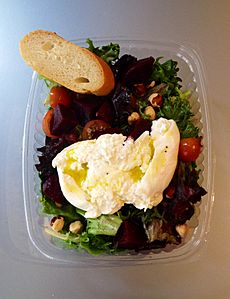Burrata facts for kids
Quick facts for kids Burrata |
|
|---|---|
| Lua error in Module:Wikidata at line 70: attempt to index field 'wikibase' (a nil value). | |
| Country of origin | Italy |
| Region | Apulia |
| Town | Andria |
| Source of milk | Cows |
Burrata is a yummy Italian cheese. It's made from cow's milk, and sometimes even buffalo milk. This special cheese mixes mozzarella and cream.
The outside of burrata is a firm cheese shell. But the inside is super soft and creamy. It has a special filling called stracciatella mixed with cream. This gives it a really unique, soft feel when you eat it. This delicious cheese comes from a region in Italy called Apulia.
Contents
Discovering Burrata's History
Where Did Burrata Come From?
Burrata comes from Murgia, a place in southern Italy. It's made using cow's milk, rennet (which helps milk turn into cheese), and cream.
People think burrata was first made around 1900. It might have started on a farm owned by the Bianchino brothers in Andria, a city in Apulia. Some records say Lorenzo Bianchino created it in 1956.
Burrata Becomes Popular
In the 1950s, more cheese factories started making burrata. This was a clever way to use up leftover mozzarella pieces.
In November 2016, "Burrata di Andria" got a special title. This means only burrata made in the Apulia region can use that name. It's like a special badge of honor for its origin.
Even though it's now made in factories, burrata is still seen as a high-quality cheese.
Burrata Around the World
Burrata is also made in the United States. You can find it in special cheese shops, especially on the East Coast. Many Italian Americans live there, and they love this cheese.
But remember, the original "Burrata di Andria" is protected. All the steps to make it must happen in the Apulia region of Italy.
How Burrata Is Made
From Milk to Curds
Making burrata starts a lot like making mozzarella. First, rennet is added to warm milk. This makes the milk thicken and form curds.
Next, these fresh mozzarella curds are put into hot water or salty water. They are then kneaded and pulled. This process makes the cheese stretchy, like the strings you see in mozzarella. This stretchy cheese is called pasta filata.
Filling the Burrata Pouch
When making burrata, the still-warm cheese is shaped into a pouch. This pouch is then filled with small pieces of leftover mozzarella. Fresh cream is added on top of the mozzarella scraps. Finally, the pouch is carefully closed.
Traditionally, the finished burrata was wrapped in asphodel leaves. These leaves were tied at the top, making it look like a small bun. A little whey was used to keep it moist. The asphodel leaves should still be green when you eat the cheese. This shows that the burrata is very fresh.
Today, you often find burrata sold in plastic bags or containers. Sometimes it's even stored in a liquid to keep it fresh.
Enjoying Burrata
The Best Way to Eat It
When you slice open a burrata, the creamy stracciatella inside flows out. The cheese has a rich, buttery taste. It also keeps its fresh milk flavor.
Burrata tastes best when eaten within 24 hours of being made. After 48 hours, it's usually not considered at its freshest.
Delicious Serving Ideas
Because of its rich flavor and different textures, burrata goes well with many foods. You can enjoy it with a fresh salad. It's also great with prosciutto crudo (a type of ham).
Try it with crusty bread, fresh tomatoes, and a drizzle of olive oil. A little cracked black pepper can add a nice touch. Burrata is also fantastic on pizza, pasta, or with a hint of chili.
See also
 In Spanish: Burrata para niños
In Spanish: Burrata para niños
 | Aurelia Browder |
 | Nannie Helen Burroughs |
 | Michelle Alexander |


